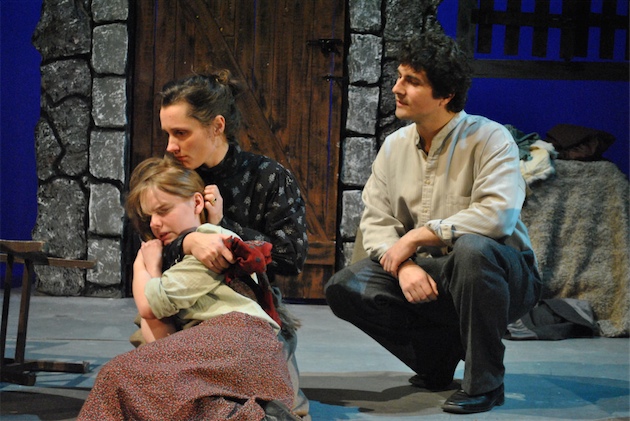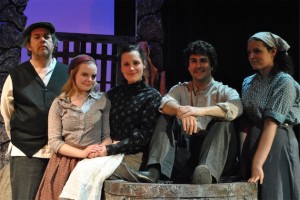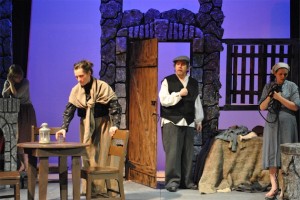 In 1999, at York University, Todd Hiscock acted in the Ugo Betti thriller Crime on Goat Island. Now, eleven years later, Todd returns to the play – this time as the director.
In 1999, at York University, Todd Hiscock acted in the Ugo Betti thriller Crime on Goat Island. Now, eleven years later, Todd returns to the play – this time as the director.
“It’s a really good play for the actors,” explains Hiscock. From the time he performed in the play, he always had ideas for those characters. “Three really very strong roles for women, and a really demanding male role. All with hidden agendas and interactions.”
Nicole MacDougall, who plays Sylvia in the play, says of the process that it’s “hard to get into all the bad stuff that happens to them. It’s a great exercise; a challenge.”
 Beyond challenging his actors, Hiscock had other reasons for bringing the play to CBU. For one, Ugo Betti – the playwright behind Goat Island—is actually one of Italy’s most highly regarded, great playwrights. “Just after Pirandello (who wrote Six Characters In Search of an Author), except Ugo Betti may have written more plays.” Despite this fact, many have never heard of this play—or Betti—at all. “It could be intriguing for people to see a new play, and a new playwright, for the area,” says Hiscock.
Beyond challenging his actors, Hiscock had other reasons for bringing the play to CBU. For one, Ugo Betti – the playwright behind Goat Island—is actually one of Italy’s most highly regarded, great playwrights. “Just after Pirandello (who wrote Six Characters In Search of an Author), except Ugo Betti may have written more plays.” Despite this fact, many have never heard of this play—or Betti—at all. “It could be intriguing for people to see a new play, and a new playwright, for the area,” says Hiscock.
There are also issues attached to the play that have relevance to today and to our area. The play takes place just after WWII and many of these dualities spring from this. It touches on issues of a family member being lost in battle, and the efforts it takes to cope and survive with their loss and the new roles which must be taken on as a result.
Many of the themes of the play deal with duality – dark and light, etc. The story follows three women who live on Goat Island, for whom the goats represent both a blessing and a curse. They eat and destroy everything on the island, so it is a barren, depressing place; however, they are also how the women make a living and can survive on their own. A theme that, many would say, could be applied to many families in Cape Breton when looking at things like the former steel plant and mining areas. This is their lives until a man – Angelo (played by Ron Newcombe) – enters their lives and presents them with more duality: love and hate; freedom and oppression; good and evil.
 Betti, before turning to writing, worked with the law as a lawyer, judge and magistrate, and was thus familiar with the duality of the criminal element. These elements come across through the character of Angelo – both an angel and a devil – and his interactions with the three women. “The play is very physically intimate,” explains Todd. “Much of the character development and interaction comes through these very close quarters.” Through these interactions, a very intense story is told. A story of violence, oppression, love and family that, according to MacDougall, “becomes very poetic at times.”
Betti, before turning to writing, worked with the law as a lawyer, judge and magistrate, and was thus familiar with the duality of the criminal element. These elements come across through the character of Angelo – both an angel and a devil – and his interactions with the three women. “The play is very physically intimate,” explains Todd. “Much of the character development and interaction comes through these very close quarters.” Through these interactions, a very intense story is told. A story of violence, oppression, love and family that, according to MacDougall, “becomes very poetic at times.”
And if all this isn’t enough to bring you in, I asked Nicole and Todd for some final selling points. Nicole stated that “if you like dark and twisted stuff, come see this. If you don’t like dark and twisted stuff, come see it anyways.” And Todd’s eyes lit up when he told me, “There’s a gun in it!” When I asked about its purpose, he became cryptic, but explained that it had a very interesting role.
Crime on Goat Island opens at the Boardmore Playhouse on Tuesday, January 26th at 7pm with a pay-what-you-can admission price. The show will continue Wednesday through Saturday with 7pm showings, and a final show on Sunday, January 31st with a 2pm matinee. Tickets can be purchased at the Boardmore box office.

